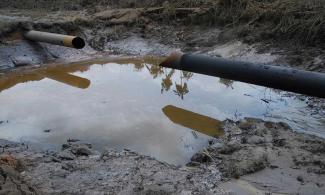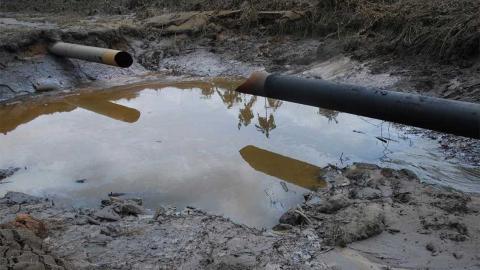
“We are hungry. Since this spill happened, things have been tough; we are no longer getting fish in the river. The entire river is crude oil; you can observe it yourselves. Tell them we are hungry and we need relief materials," said Doubo Taraseli, a fisher woman. “As you can see, I am just returning from fishing and I have toiled from morning till now, but I returned with very few compared to what the situation used to be before this spill occurred.”

The impact of the damaged Trans Ramos pipeline, which carries petroleum to the Trans Forcados export terminal, is beginning to appear. Volumes of oil have been poured into river bodies, draining affected communities of their major livelihood — fishing.
“We are hungry. Since this spill happened, things have been tough; we are no longer getting fish in the river. The entire river is crude oil; you can observe it yourselves. Tell them we are hungry and we need relief materials," Doubo Taraseli, a fisher woman, told Environmental Rights Action (ERA) and Friends of the Earth Nigeria (FoEN).
“As you can see, I am just returning from fishing and I have toiled from morning till now, but I returned with very few compared to what the situation used to be before this spill occurred.”
No reason has been given for the spill, which happened exactly a month ago, but a joint investigation has been undertaken by the operators of the pipeline Shell Petroleum Development Company (SPDC) and other relevant bodies. In a report by ERA and FoEN released to journalists in Yenagoa, the Bayelsa state capital, the environmental advocates said the spill had impacted communities in Delta and Bayelsa states.
The field trip, conducted in Aughoro community and environs, revealed that its inhabitants have lost their source of drinking water and the environment has been polluted:
“The impacted environment tells a tale of heavy volume of crude oil spewed into the environment. All around the river banks tells this tale of oil industry induced pollution, as the grasses and other vegetations bear the signs clearly, including fishing nets and timber," the field monitors observed.
“Besides the crude oil stained grasses and other vegetation and materials at river banks, the surface of the entire body of water (on the river) displayed the colours associated with crude oil on water. Owing to the time of ERA/FoEN’s visit (sun was high), the crude oil actually melted and presented shining reflections on the water, presenting different colours."
Justin Gbagbiri, Secretary of Aughoro’s Community Development Committee (CDC), said the river, which serves the cooking and drinking needs of the community, has become unusable since the spill: “This river is one of our major sources of drinking; if we want to cook, we use this water. But since this devastation (the crude oil pollution), we cannot use this water again.
The spill also has an economic effect on the country. Nigeria might not be able to meet its export target of 2.3 million BPD, which its 2018 budget was built on. The country loses between 200,000 and 250,000 to the pipeline damage.
Another amage to the Nembe Trunk line, which supplies crude oil to the Bonny Export terminal, forced Shell to declare force majeure on the export of a favoured grade of Nigeria Petroleum, Bonny Light.